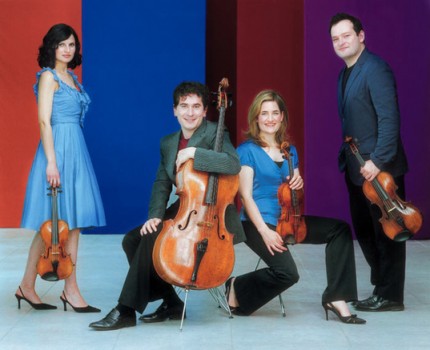Belcea Quartet’s artistry blooms in hothouse conditions
A packed house and eighty degree-plus temperatures put University of Chicago Presents in the awkward position of having to offer its season finale in a non-air conditioned Mandel Hall Friday night, a venue that felt more like a Turkish bath than a concert hall.
That the Belcea Quartet gave such a memorable and expressive concert under such oppressive conditions—with the sweat literally pouring off of their instruments and soaking through their shirts and gowns— only served to underline what a remarkable ensemble Belcea is. The unified concentration to not allow the environment to negatively affect the introspection of their performances was a demonstrative act of will.
Many quartets would have rushed through the evening but from the opening notes of Beethoven’s Op. 18. No. 6 in B-flat Major, it was clear from the nuanced quiet and deliberate dynamic contrast that the young British ensemble was taking charge and setting the standard of playing so carefully that audience members would be forced to pay attention.
Beethoven came relatively late to the string quartet form, preferring genres early on that would not invite such obvious comparisons to Haydn and Mozart. When he did publish his first six quartets under Op. 18 in 1801, he put the best of the bunch at the beginning and end of the set.
Op. 18, No. 6 allows a quartet to show that it possesses the transparency of tone needed for Haydn and Mozart and yet affords an opportunity to reveal rhythmic playfulness in the syncopations of its wild Scherzo ride as well as the Romantic introspection of its La Malinconia finale. Given the tendency for many quartets to oversentimentalize the latter and to overplay the former, the restraint and exquisite unified Belcea blend was a sheer pleasure to bask in and the familiar piece felt as fresh if it were being heard for the first time.
The two string quartets of Karol Szymanowski have never achieved the popularity of the iconic six quartets of Béla Bartók despite the fact that the composers were Eastern European contemporaries who were both interested in cross-fertilizing folk music traditions of their native Poland and Hungary, respectively, into experimental compositional styles in the early half of the 20th century.
A better argument could not be made for further performances of unfamiliar Szymanowski by placing his Second Quartet (Op. 56) alongside of Bartók’s familiar First Quartet (Op. 7) and then to play both with the high level of virtuosity, contemplation and musicianship that the Belcea Quartet did.
To have heard the Szymanowski on a handful of its available recordings—most, now out of print—does not compare to experiencing it live on such a high level. To call the work revelatory does not do it justice and to hear it alongside such a fresh take on the Bartók made a satisfying juxtaposition that showed us that Bartók’s indeed had worthy contemporaries that were drinking the same water.
Posted in Performances





